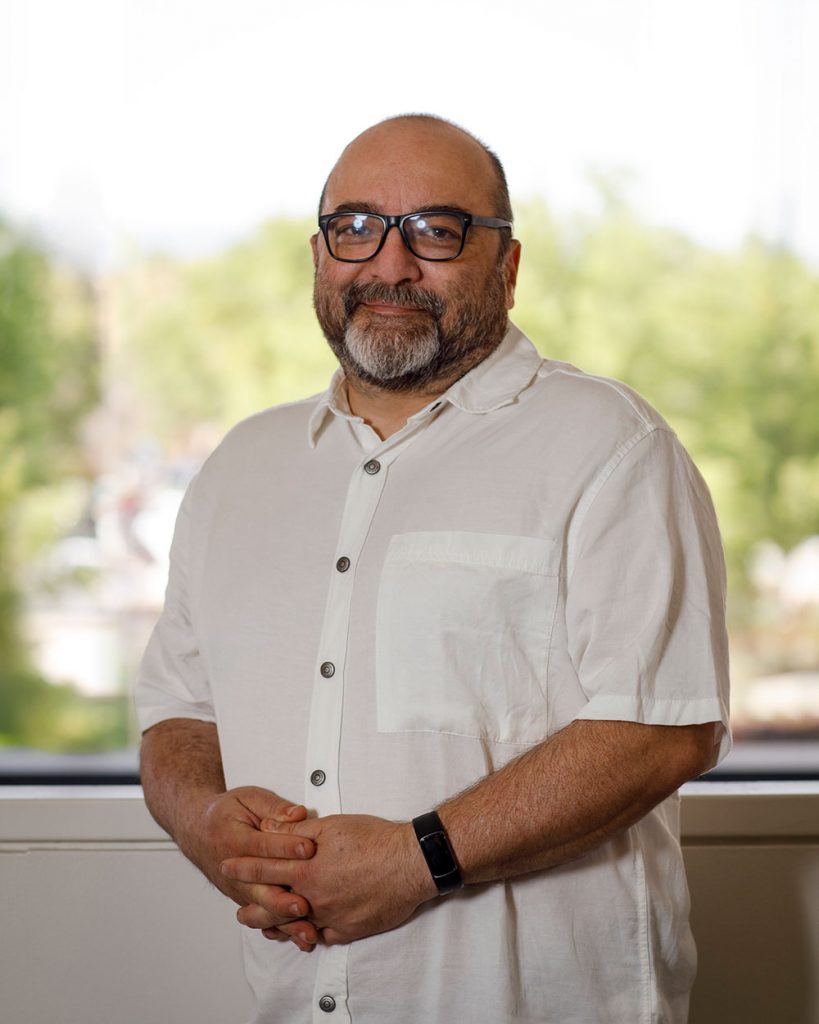Ali Pinar selected for his leadership in network science

For a man whose job is to imagine outcomes, Ali Pinar says he was completely surprised when the Society for Industrial and Applied Mathematics named him one of their 2023 fellows.
“When I was doing my Ph.D., if somebody told me I would be a SIAM Fellow — no way,” Ali said. “You just put these things together one brick at a time. You’re building something in your career and getting that recognition. That is just surprising.”
Ali earned his bachelor’s and master’s degrees from Bilkent University in his native country Turkey, then came to the U.S. and obtained his doctorate in computer science at the University of Illinois.
“I interned at Sandia as a Ph.D. student,” he said. “I loved the culture at Sandia, and there were multiple people that I said, ‘When I grow up, I want to be like them.’”
Studying every system imaginable
He has spent the last 15 years at the Labs studying network science, getting his U.S. citizenship along the way.
“Networks can be like physical networks, as in a power grid, cyber network or water networks. These networks have high consequences if they fail,” Ali said. “There are also biological networks within bodies. We look for abnormal behaviors. How can I make it more resilient? For example, if it is going to be a disaster if two powerlines go down at the same time, how do I fix that problem by building, adding other lines or using my current resources in a way so that I don’t put all my eggs in the same basket?”
Ali said he and his fellow network scientists look for patterns, potentially planning for worst-case scenarios. For example, he can identify bad actors in cyberspace by identifying behavior on accounts that are managed by the same people, or accounts that are bots, by observing a product review on a shopping site that is then followed by 10,000 more on the same product, around the same time. It’s all a matter of looking for abnormal behavior outside of the expected.
“But to define abnormal you need to understand what is normal,” Ali said. “If you look at a functional unit, like protein interaction networks, you know how proteins function in a body. If you see a bunch of proteins that just appear at the same time, you know these should be doing something. It cannot be just coincidence. Then you just start looking at: What do they do at the same time? What is the function of this protein? What is the pathway? How do they interact?”
Recognized for leadership
Network science is a field of study that has fired Ali’s imagination and intellect for years. But his scientific work was far from the only thing that garnered the attention of the Society for Industrial and Applied Mathematics, which named him a fellow “for theoretical, algorithmic and application impacts, and community leadership in combinatorial scientific computing and network science.”
“I started a workshop within SIAM on network science,” he said of the annual meeting that draws more than 100 network professionals each year. “People who are doing statistics or more applied sciences like cybersecurity, I thought, ‘Why don’t we come together, build a platform for like-minded people and discuss things in that way.’”
Ali launched the workshop in 2003 and currently serves as the chair of the steering committee. “I like the interactions, and I see new people, especially younger Ph.D. students, making the connections and getting advice from everybody. They are going through the same things you’ve been through, and you can help them. I like that feeling of community and how people share their ideas,” he said.
Working with the best
Ali prizes that feeling of community at Sandia.
“I love interdisciplinary work,” he said. “It’s not just doing it for the sake of my publishing but working with the domain scientists and making a real impact.”
Ali appreciates the Labs for two vital reasons.
“First there are a lot of opportunities, and second there is the culture of Sandia people. If I just approach someone, they welcome you with open arms. ‘Yeah, let’s do work together!’ We could do something better and it’s more goal-oriented, so we are not trying to prove who is smarter. We’re just teaming up for a national security problem and just helping each other to solve that problem. That is the ultimate goal,” he said.
Ali appreciates his mentors at Sandia and around the world and is committed to use his fellowship to pass his expertise and experience on to others.
“I really felt gratitude for them. You don’t do it by yourself,” he said. “This fellowship and my level at Sandia now means I have the responsibility to speak up, to reach out. If you see something is wrong, even here, it’s your responsibility to say something. It’s your job to speak up.”